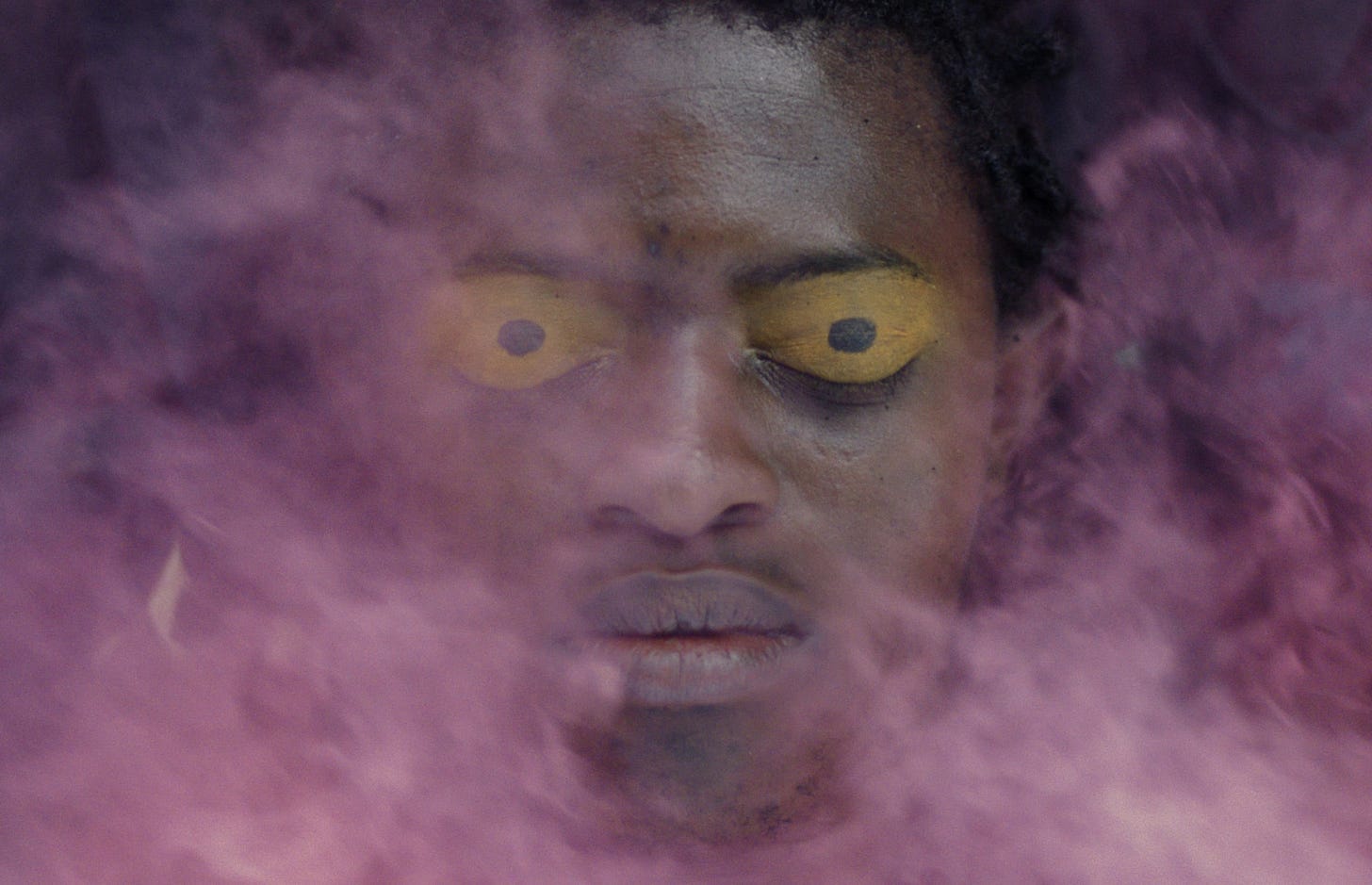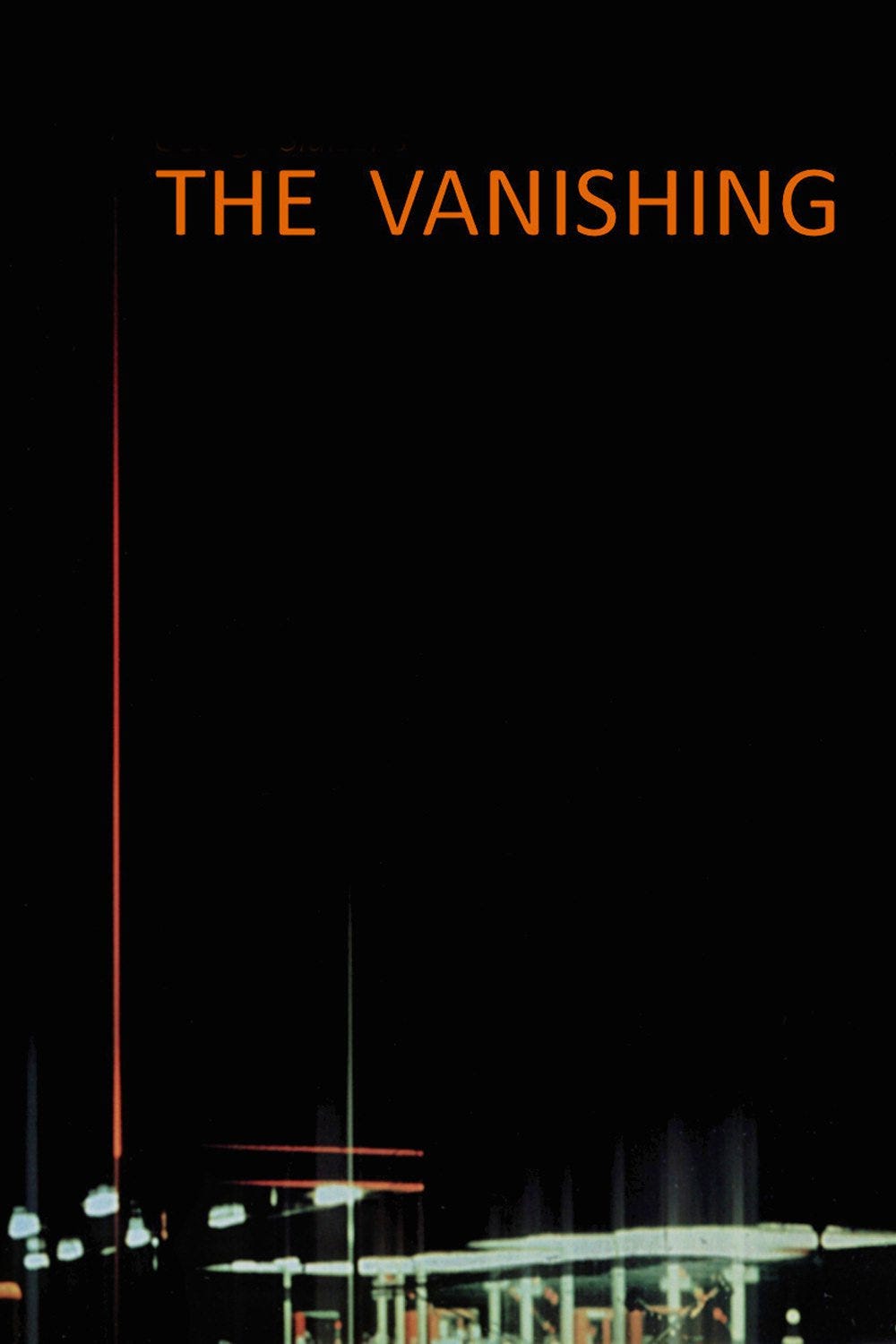Directed by Baloji
Belgium, 2023
Witchcraft... check. Twins... check. Hansel and Gretel... check. And, erm, gangsters clad in princess-pink? Check. Take these ingredients, whisk them together and what results is a heady brew indeed: Omen, a fantastical tale from Belgian musician-turned-filmmaker Baloji.
The film’s original French title, Augure, evokes the augurs: priests from ancient Rome who used natural events to interpret the will of the gods. As a profusion of signs and symbols cascade across the screen, any augurs watching would be forgiven for packing up their bones in bewilderment.
Omen opens with a widescreen shot of the Sahara Desert. A lone rider in black gallops towards us – yes, we have been here before. The rider canters through a collection of scarecrows (scarecrows in the desert?). As he approaches a lake it becomes apparent that the rider is not a man but a woman. She dismounts, kneels by the lake side and releases a breast from her tunic. Purple clouds of breastmilk flow into the lake, filling it – no, we have definitely not been here before.
Omen is an ambitious film grappling with big themes: spirituality, grief, and the tug of war between tradition and the modern world. It tells the story of four characters, all of them marked by the taint of sorcery. Koffi (Marc Zinger), a Congolese man living in Europe, his mother Mama Mujila, his sister Tshala, and last but certainly not least, an unrelated boy named Paco who’s part Artful Dodger, part shaman.
It is, however, Koffi’s story that forms the core of the film. That story begins in Belgium where he lives with Alicia (Lucie Debay) his white fiancée. She is shaving off his Afro as they prepare to travel to the Democratic Republic of Congo. Koffi’s plan is to introduce Alicia, pregnant with their twins, to his family but also to attempt a reunion with his parents. Born with a striking birthmark on his face he was known as a zabolo – devil marked. His mother banished him to Europe 20 years earlier, with the sorcerer’s label.
Koffi is hoping that the large dowry he has scraped together will help heal old wounds, but unsurprisingly events don’t work out as planned. Despite his concentrated efforts to learn Swahili and his new short haircut, a frosty welcome awaits him. Koffi is clearly still the outcast. Whispered comments and fierce stares, notably from his mother… then disaster strikes. Cradling the newborn baby of one of his sisters, he has a seemingly innocuous nosebleed. Blood spatters the child and bedlam takes over. Cue a genuinely frightening scene as Koffi is dragged off to the local shaman who dunks his head repeatedly in water before nailing a huge wooden mask around, and fortunately not into, his head. Alicia looks on bewildered – is this the kind of family you want to marry into?
That tension between the ancient and the modern flows through the film, but while for some these forces are in opposition, for others they are complementary. Koffi’s sister, Tshala (played by Eliane Umuhire, last seen here in the Afrofuturist musical, Neptune Frost) has escaped the traditions of her upbringing by moving to South Africa, as the family say reproachfully, “to live with white Africans.” The one member of the family sympathetic to his plight, when asked by Koffi if she would come to live in Europe, she retorts that Europe has been over since 2008: Nigeria and South Africa are much more exciting destinations. She sees herself as a woman of the 21st century but when she has a medical problem she eschews an orthodox doctor and returns to the mask-wielding shaman.
As for his father, Koffi searches for him, he is a mineworker, but he is nowhere to be seen. Absent, but his patriarchal shadow haunts the film, as does that of the long dead dictator, Mobutu, whose iconic leopard-skin toque is ever-present in the crowd.
Yet it’s Mama Mujila (Yves-Marina Gnahoua) who is not only the pillar of the family, but also of Omen. When late in the film her history is uncovered, you begin to understand the roots of her deep-seated resentment toward her only son. But here lies the problem with the film: Mujila’s story is a heart-rending one but feels underdeveloped as Baloji’s fragmentary and allusive approach struggles to give each narrative strand its due. Perhaps reflecting his background in rap music, we get an array of samples when a complete track would give us something more coherent.
This drawback is particularly apparent when it comes to Paco (Marcel Otete Kabeya), the youthful leader of a child gang known as The Goonz. As well as dealing in black market antibiotics the boys all wear pink ballet tutus as a homage to Paco’s dead sister – their choreographed poses recall the dancers in Kanye West’s Runaway. The Goonz are engaged in a turf war with equally colourful masked rivals that initially plays out in the Bacchanalian festivities leading to Easter – costumes and bands imported from the New Orleans Mardi Gras – but before long their story takes on a darker tone. Paco’s tale is the more fantastical but regrettably only dances around the edges of Omen’s narrative. Both Koffi and Paco are subject to epileptic seizures, their only seeming connection – a link that also adds to their aura of mysticism.
The narrative threads may begin to fray but the visual dynamism, rhythmic editing, and propulsive soundtrack will keep you absorbed, if not bewitched. Baloji and his director of photography, Joachim Philippe, have a liking for impressively vivid tableaux, but before you are lulled into watching what seems like an art installation, the stillness is disrupted by eccentric camera angles, trippy beats, and a surreal outpouring of archetypal imagery. A blend of European folklore (including Hansel and Gretel’s gingerbread house) and Congolese animism come together in a cocktail, laced with no little humour. As Tshala explains:
We’re in a different space-time continuum.
As I noted earlier, Omen is a singular film of grand ambition. At times that ambition overwhelms the film itself but given the choice between Baloji’s visually-arresting high-wire creativity and the solid, but safe, studio product that usually graces our screens, I know what I would opt for.
Reids’ Results (out of 100)
C - 76
T - 79
N - 79
S - 76
Thank you for reading Reids on Film. If you enjoyed our review please share with a friend and do leave a comment.
Coming next… The Vanishing(1988)










